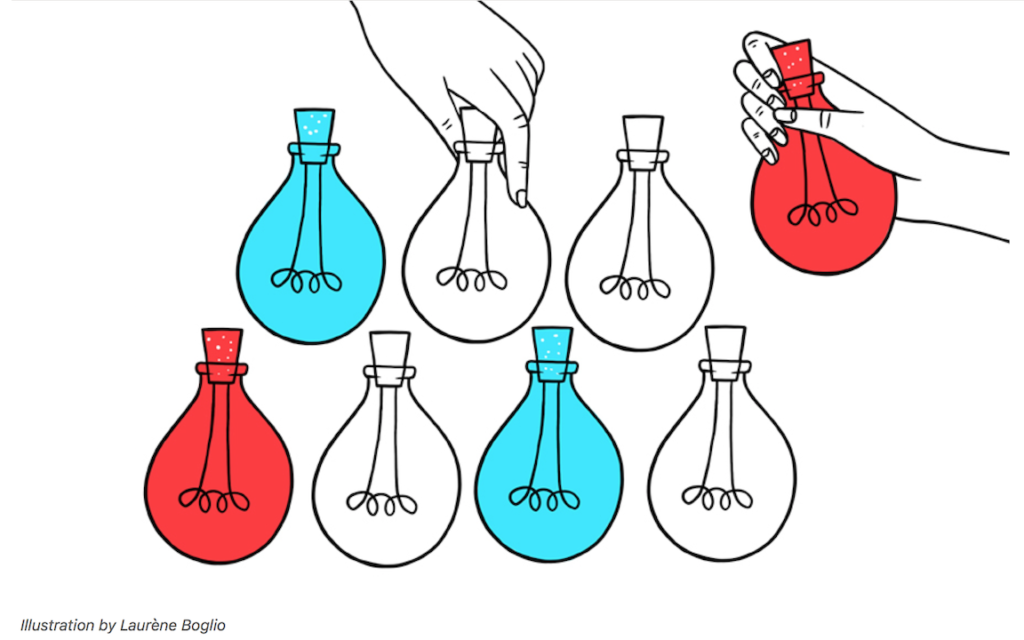by Rebecca Sachs, PhD
Obsessive Compulsive Disorder (OCD) is a condition that affects all people of all ages. The obsessions in OCD are unwanted intrusive inner experiences (thoughts, images, or urges) that are accompanied by intensely distressing feelings. In order to feel better, a person engages in compulsions, behaviors (observable or mental) that are an attempt to neutralize or get rid of the obsessions and related distress. While most individuals at some point in their lives have an obsessive thought or do some compulsive behavior, in order for a diagnosis of OCD to be made, the cycle of obsessions and compulsions must be so considerable that it takes up a lot of time (more than an hour every day), causes intense distress, or gets in the way of important activities that the person values.
In general, Autistic individuals are more likely to experience co-occurring mental health conditions compared to neurotypical peers, and in regard to OCD, they have higher rates compared to the general population. While OCD is one of the more common mental health conditions, some estimates indicate that it can take up to 14–17 years from the onset of symptoms for a person to get an appropriate diagnosis and effective treatment for OCD. I imagine that these numbers are even higher for Autistic individuals who have OCD. Professionals and caregivers might overlook giving a diagnosis of OCD when Autistic features are prominent and an autism label is long-standing. Conversely, they may mistakenly attribute behavioral indicators of autism to an existing diagnosis of OCD. The reality of misdiagnosis, as well as underdiagnosis of each condition often results in delayed access to appropriate care.
Why OCD or Autism is Often Missed When Co-Occurring
Reported prevalence estimates of OCD in Autistic individuals range from 2.6 to 37.2%. Various factors can make it challenging to differentiate OCD from autism, as well as disentangling the symptoms of OCD from traits and behaviors associated with autism when these conditions co-occur. Some of these factors are:
diagnostic overshadowing- limits of autism and OCD measures
- atypical presentations of OCD in many Autistic individuals
- heterogeneity of OCD content
- heterogeneity of autism presentation
- variability of cognitive and speaking abilities in Autistic individuals
- variability in social-communication, and sensory, motor, and interoception differences in Autistic individuals
It should be noted that approximately 35% of Autistic youth have a co-occurring intellectual disability (ID) which can further impact differentiating each condition.
Intrusive, repetitive thoughts are present in both conditions and repetitive behaviors are core features of both OCD and autism. Practically speaking, the overlap between behaviors related to autism and symptoms of OCD can present as:
- The preference for sameness and difficulty with adjusting to change, common in Autistic youth, may functionally look similar to OCD related obsessions, compulsions, and associated distress (eg. severe distress when something in their classroom is moved, preferring a certain seat at the kitchen table).
- Behaviors related to sensory-motor differences associated with autism, especially those that are more subtle, can look like OCD related compulsions, avoidance or safety behaviors (e.g. finger flicking, hair twisting and avoidance of certain clothes or mixed texture foods).
- Behaviors related to or in response to social communication and social interaction differences characteristic of autism, can look similar to OCD related reassurance-seeking and compulsions (e.g. asking a question repeatedly to which the answer is already known, scripted or echolalic speech, taking time to respond in a conversation, and conducting social autopsies).
Understanding the Similarities & Differences
It is important to distinguish if a behavior is related to Autistic differences, OCD, or both. This distinction will guide treatment planning to help determine whether a behavior should be a treatment target, and if so, how to best approach it. The table below highlights notable considerations to take into account when distinguishing between the repetitive thoughts and behaviors of OCD and autism.
| OCD | Autism | |
|---|---|---|
| Course | Although OCD can occur at any age, the typical age of onset is between 8-12 years old and between late teen years and early adulthood. Symptom presence may come and go. Symptom severity often increases over time (when OCD is not treated). | Autism indicators can be recognized between 12-24 months old. Core traits, behaviors, and information processing differences that are characteristic of autism are present across the lifespan for an Autistic individuals and typically recognizable before age of 5. While the level of support needed can vary across an Autistic individual’s lifespan, it is typically stable. |
| Content | Themes of contamination, Fear of harm, Taboo/unacceptable thoughts, Checking, Counting, Hoarding, Uncertainty, Just Right, Responsibility/Scrupulosity. | Great variability in content of repetitive thoughts. * higher frequencies of hoarding obsessions * less likely to experience thoughts with aggressive, contamination, sexual, or religious content *less likely to do contamination and aggressive obsessions, and checking compulsions. “Lower-order repetitive behaviors” (stereotypies that are self-stimulatory and involve repetitive sensory and motor actions, stereotyped manipulation of objects, and repeated, rhythmic body movements, like rocking) seem distinct to autism. Behaviors driven by obsessions related to forbidden thoughts and contamination fears were not present for those individuals with only autism. |
| Experience of repetitive thoughts and behaviors | Bothersome, distressful, ego-dystonic (upsetting thoughts that are not compatible with their values and beliefs). May experience fear, embarrassment, shame in response to the repetitive thoughts. Sense of being compelled/unable to control. | Not bothersome, at times enjoyable, at times considerably enjoyable and rewarding, ego-syntonic (thoughts that are compatible with their values and beliefs). Do not feel a need to control. |
| Context of Distress | Distress is in response to intrusive, unwanted inner experiences (thoughts, images, urges, emotions)/repetitive thoughts. Repetitive behaviors alleviate the distress associated with these intrusive, unwanted inner experiences. | Distress is in response to being interrupted/stopped from engaging with repetitive thoughts or from doing repetitive behaviors. Distress can also be in response to an unmet need/desire that is trying to be communicated to others with repetitive behavior. |
| Functionality | Repetitive behaviors serve the function of escape/avoidance of distressing/uncomfortable inner experiences (eg. obsessions, anxiety, disgust). | Repetitive behaviors may serve various functions: *escape from distressing/ uncomfortable inner experiences (eg. worries, anxiety, physical pain) *escape from sensory discomfort *escape from a demand, including social demands *gaining attention *gaining/providing self a preferred/pleasurable tangible, privilege, experience *obtaining /modulate sensory stimulation *preserve sameness |
| Response to Medications | First line pharmacological treatments targeting OCD symptoms (selective serotonin reuptake inhibitors (SSRIs)) and other pharmacological treatments targeting OCD symptoms decrease frequency and/or intensity of repetitive thoughts and behaviors. | First line pharmacological treatments targeting OCD symptoms (selective serotonin reuptake inhibitors (SSRIs)) and other pharmacological treatments targeting OCD leave repetitive thoughts and behaviors unmodified. |
Other factors can help identify differences between autism and OCD. Core differences in social communication and social interaction throughout the lifespan even in early childhood are associated with autism but not OCD. While some Autistic individuals may develop compensatory strategies (masking or compensation skills) to navigate social situations, these strategies are not always effective when social tasks are novel or require considerable sustained effort. A detailed psychosocial and developmental history should be included to understand social struggles.
When doing a developmental history, it is also helpful to explore current and past motor-based difficulties that are associated with autism, but not OCD. Autistic individuals can experience hypotonia, apraxia, clumsiness, toe walking, gross motor delay, incoordination, reduced grip strength, poor balance, postural stability, abnormal gait, joint flexibility, and manual dexterity, difficulties with balance, slowed speed, and dysrhythmia with timed movements of the hands and feet. It should be stressed, however, that there is no one trait or single behavior (or lack- there-of) that indicates a diagnosis or rule-out of autism.
The Complexity of Assessment
Most measures of OCD were not developed with Autistic individuals in mind. Ideally, assessment of OCD in Autistic individuals takes a multidisciplinary and comprehensive approach. OCD assessment should include current clinical and test findings, behavioral observation and analysis (not to be confused with Applied Behavioral Analysis), and a thorough developmental and medical history. There is no single measure for diagnosing OCD, for Autistic or non-Autistic individuals.
| Measures to consider to assist with differential diagnosis of OCD in autistic youth: (See Kerns et al. (2016) and Moskowitz, Rosen, Lerner, & Levine (2017) for a review) |
|---|
| Reliable measure to evaluate repetitive behaviors in Autistic youth: –The Children’s Yale-Brown Obsessive Compulsive Scales for ASD(CYBOCS-ASD (Scahill, et al., 2014, Scahill, et al., 2006). –Autism Diagnostic Interview-Revised (ADI-R) –Repetitive Behavior Questionnaire (RBQ) –Repetitive Behaviour Interview (RBI) –Repetitive Behaviour Scale-Revised (RRB-R) |
| Self-report questionnaires/rating scales for more verbal/speaking youth that can be used with Autistic youth (with OCD subscales) –Spence Children’s Anxiety Scale (SCAS) –Revised Children’s Anxiety and Depression Scale and Subscales (RCADS) |
| Self-report questionnaire/rating scale for more verbal/speaking Autistic youth with a subscale on Uncertainty –Anxiety Scale for Children- ASD (ACS-ASD) |
| Other-Informant Questionnaires/rating scales for more verbal/speaking youth (with OCD subscales) –Revised Children’s Anxiety and Depression Scale and Subscales (RCADS) –Spence Children’s Anxiety Scale (SCAS) –Autism Spectrum Disorder- Comorbid for Children (ASD-CC) |
| Other-Informant Questionnaires/rating scales for youth with ID (with Compulsive subscale) –Anxiety, Depression, and Mood Scale (ADAMS) |
| Interviews designed for NT youth that can be used: (with OCD subscales): –Anxiety Disorders Interview Schedule (ADIS-IV C/P) –Kiddie-SADS – Lifetime Version (K-SADS-PL) |
| Interviews designed for autistic youth ACI-PL (OCD Scale/with OCD subscales): –Anxiety Disorders Interview Schedule- Autism Addendum (ADIS-A) –CY-BOCS-ASD, for verbal/speaking teens with insight |
| Direct Observation –Behavioral Avoidance Test (BAT) |

